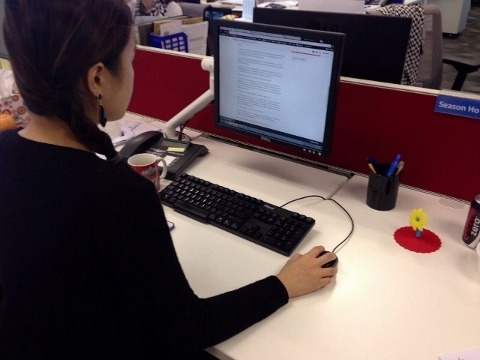by Season Ho
Original post: http://edelmanhkinterns.tumblr.com/post/110057080402/learnings-of-crisis-issue-management
Before stepping into the PR industry, when I browse the websites of international big PR agencies, I always wonder what the 24-hour crisis hotline is for. What elements are so urgent to a company that requires immediate follow-ups? During my internship at Edelman, I have the opportunity to learn and explore more. I gradually understand how important it is for a corporate organization to prepare for any reputational risks. Hence, crisis planning and reputation management is crucial.
In the new age of digital media, the possibility that companies facing risk become much higher in particularly information can spread widely via various social media platforms. At Edelman, we have a specialized practice to help our clients from media training to rapid-response crisis management.
As an intern, I am grateful to have the opportunity to participate in some issue management projects. When companies unable to respond or address to the issue, it escalates quickly when you are least prepared for it. The damage to corporate reputation sometimes is irreparable.
Here are some areas that I have learned through providing different training, trend monitoring and strategy development to help a company to get prepared for crises.
Crisis Preparedness
How to prepare for crisis? It’s important to understand what could be a crisis for an Organization. It is critical to have a clear, consistent, and widely-understood management approach how to handle crisis and also when receiving lots of media enquiries and how to respond to the media.
Edelman has tailor-made training to match the needs and culture of each organization. During my internship, I received different kinds of trainings including media training & crisis planning. The program includes training programs for CEO/Senior Executives or often spokesperson such as Corporate Communication Director. Crisis training will have real-time crisis simulations to test plan and response time. Simulated web sites, inbound calls and faxes are also used to mimic reality. Some others include training specializing in financial media, especially for broadcast media interviews. We also helped our clients recognize that media trainings are a long term investment in their brands and helped the spokesperson of the company to handle a variety of media interviews and public speaking situations.
Senior executives are extremely aware of the need to be better prepared to manage any kind of risks in order to protect their organizations and reputations. We always hear the old saying ‘prevention is better than cure’, but in the case of having training, I think it is ‘precaution as important as cure’!
Trend Monitoring
Responses have to be made quickly when it comes to issue management. However, before responding to the issue, one must not overlook the importance of trend monitoring. I have involved in doing research and monitoring for issues and crisis. Trend monitoring is important as every client wants to know what people are saying about the company, and how ‘heated’ the issue is especially in this boundless internet world.
The monitoring includes traditional news monitoring, social media monitoring and opposition desk research. Through all these searches and monitoring, we can accurately identify the stakeholders and strategic plan can be made in a more efficient way. I still remember helping my team to do media monitoring for a client that required monitoring as a region not just a market. As an international PR agency, we utilized our global network to work together with offices in US and UK to provide a 24-hour media monitoring across different regions. This is the first time I feel I am working for a truly global organization. While maintaining close and active communication with the US and UK teams, we are able to gain quantitative and qualitative insight into media coverage for our client’s business. With this basic trend monitoring and research, substantial support is provided for defining the problems and assessing risk. Doing the trend monitoring also helped me to better understand client profiles and the development of the issue, it also exposed me to different media outlets around the world. In fact, doing monitoring is one of my favorite tasks at work!
As the old saying, ‘no news is good news’. Yet, situated in such a digital age, issues and crisis are sometimes inevitable. Edelman helps organization to prepare and deal with it. Reading the successful examples of the global Edelman team in dealing with issues and crisis, except feeling impressed, I am also looking forward to learn more from this practice. We don’t have to be afraid of the words ‘issue’ or ‘ crisis’ as long as there is a good team backing you up, and Edelman, the Team Dragon Boat, is surely the one.
Original post: http://edelmanhkinterns.tumblr.com/post/110057080402/learnings-of-crisis-issue-management
Before stepping into the PR industry, when I browse the websites of international big PR agencies, I always wonder what the 24-hour crisis hotline is for. What elements are so urgent to a company that requires immediate follow-ups? During my internship at Edelman, I have the opportunity to learn and explore more. I gradually understand how important it is for a corporate organization to prepare for any reputational risks. Hence, crisis planning and reputation management is crucial.
In the new age of digital media, the possibility that companies facing risk become much higher in particularly information can spread widely via various social media platforms. At Edelman, we have a specialized practice to help our clients from media training to rapid-response crisis management.
As an intern, I am grateful to have the opportunity to participate in some issue management projects. When companies unable to respond or address to the issue, it escalates quickly when you are least prepared for it. The damage to corporate reputation sometimes is irreparable.
Here are some areas that I have learned through providing different training, trend monitoring and strategy development to help a company to get prepared for crises.
Crisis Preparedness
How to prepare for crisis? It’s important to understand what could be a crisis for an Organization. It is critical to have a clear, consistent, and widely-understood management approach how to handle crisis and also when receiving lots of media enquiries and how to respond to the media.
Edelman has tailor-made training to match the needs and culture of each organization. During my internship, I received different kinds of trainings including media training & crisis planning. The program includes training programs for CEO/Senior Executives or often spokesperson such as Corporate Communication Director. Crisis training will have real-time crisis simulations to test plan and response time. Simulated web sites, inbound calls and faxes are also used to mimic reality. Some others include training specializing in financial media, especially for broadcast media interviews. We also helped our clients recognize that media trainings are a long term investment in their brands and helped the spokesperson of the company to handle a variety of media interviews and public speaking situations.
Senior executives are extremely aware of the need to be better prepared to manage any kind of risks in order to protect their organizations and reputations. We always hear the old saying ‘prevention is better than cure’, but in the case of having training, I think it is ‘precaution as important as cure’!
 |
| In picture with Ray Rudowski, Asia Pacific Regional Director in Crisis Planning & Training. |
Responses have to be made quickly when it comes to issue management. However, before responding to the issue, one must not overlook the importance of trend monitoring. I have involved in doing research and monitoring for issues and crisis. Trend monitoring is important as every client wants to know what people are saying about the company, and how ‘heated’ the issue is especially in this boundless internet world.
The monitoring includes traditional news monitoring, social media monitoring and opposition desk research. Through all these searches and monitoring, we can accurately identify the stakeholders and strategic plan can be made in a more efficient way. I still remember helping my team to do media monitoring for a client that required monitoring as a region not just a market. As an international PR agency, we utilized our global network to work together with offices in US and UK to provide a 24-hour media monitoring across different regions. This is the first time I feel I am working for a truly global organization. While maintaining close and active communication with the US and UK teams, we are able to gain quantitative and qualitative insight into media coverage for our client’s business. With this basic trend monitoring and research, substantial support is provided for defining the problems and assessing risk. Doing the trend monitoring also helped me to better understand client profiles and the development of the issue, it also exposed me to different media outlets around the world. In fact, doing monitoring is one of my favorite tasks at work!
As the old saying, ‘no news is good news’. Yet, situated in such a digital age, issues and crisis are sometimes inevitable. Edelman helps organization to prepare and deal with it. Reading the successful examples of the global Edelman team in dealing with issues and crisis, except feeling impressed, I am also looking forward to learn more from this practice. We don’t have to be afraid of the words ‘issue’ or ‘ crisis’ as long as there is a good team backing you up, and Edelman, the Team Dragon Boat, is surely the one.

No comments:
Post a Comment
Note: only a member of this blog may post a comment.